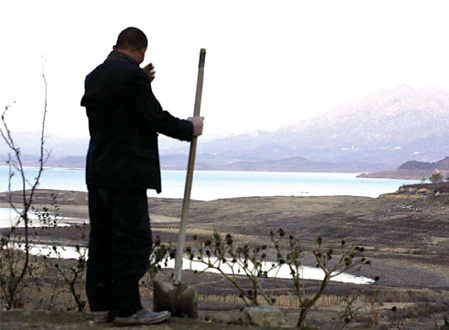 Parched land at the Miyun reservoir on the outskirts of Beijing has been used to plant grain. The city has been suffering from a severe drought problem for several years. Lin Hui
Parched land at the Miyun reservoir on the outskirts of Beijing has been used to plant grain. The city has been suffering from a severe drought problem for several years. Lin Hui
Neighboring province tightens its belts to ease Beijing's shortage
Four reservoirs in Hebei are expected to be called upon again this year to supply water to Beijing, but the water delivery plan is still being negotiated by the Beijing and Hebei governments.
The temporary plan for Beijing to get water from the four reservoirs - two in Shijiazhuang and two in Baoding - will bridge the gap until the South-to-North water diversion project is completed in 2014.
According to statistics from the Beijing water authority, the city lacked about 40 million cu m of water last year.
Water from Hebei will continue to relieve the shortage in Beijing.
The water has been channeled to the capital via canals that will eventually form part of the South-to-North water diversion project.
"We are glad to contribute our water to Beijing," said the gatekeeper of one of the four reservoirs, who did not want to be identified.
He said the reservoir delivered a lot of water to Beijing in 2009.
However, Hebei government indicated it was considering its priorities in distributing water because of shortages in Hebei province.
About 43.5 million cu m of water was delivered to Beijing between Sept 18, 2008 and July 25, 2009 during a time when the water shortage in Hebei was about 470 million cu m.
"We have to reduce water supply in Hebei to deliver water to Beijing," said an official surnamed Wu from the department of water resource in Hebei province.
Wu said Hebei was in a similar situation to Beijing and water in the reservoirs would also be needed for irrigation in 2010.
Wu said the final delivery plan would probably be released after Spring Festival.
"Delivering water from Hebei had a high cost," said Ma Jun, director of the green NGO Institute of Public and Environmental Affairs in Beijing.
Water was a serious problem for Hebei and diverting some to Beijing could pose significant challenges, Ma said.
The most important way to resolve the water shortage issue is to save water and treat sewage, Ma said.
The waste of water was also serious in Beijing and sewage treatment was not sufficient, he added.
"There should be more reclaimed water being used in Beijing," said Ma.
Water delivered from Hebei was an emergency measure and, if people did not pay attention to saving water, the source would not be able to keep up with demand beyond 2014, Ma said.
Source: China Daily
|